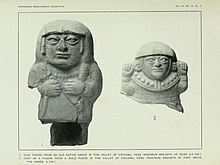Tongji (spirit medium)

| Part of a series on |
| Chinese folk religion |
|---|
 |
| Concepts
|
| Theory
Model humanity:
|
| Practices
|
| Internal traditions Major cultural forms Main philosophical traditions: Ritual traditions:
Devotional traditions:  Confucian churches and sects: |
|
|

Tongji (Chinese: 童乩; pinyin: tóngjī; Wade–Giles: t'ung-chi; lit. 'youth diviner'; Tâi-lô: tâng-ki) or Jitong (Chinese: 乩童; pinyin: jītóng; Wade–Giles: chi-t'ung; lit. 'divining youth') is a Chinese folk religious practitioner, usually translated as a "spirit medium", "oracle", or "shaman".
This word compounds tong 童 "child; youth; boy servant" and ji 乩 "to divine" (cf. fuji 扶乩 "divination; planchette writing"). Regional variants include Hokkien tâng-ki 童乩 and Cantonese gei-tung 乩童 or san-daa 神打.
A tongji or jitong is a person believed to have been chosen by a particular shen (chinese deity) or spirit as the earthly vehicle for divine expression. The Chinese differentiate a wu 巫 "shaman; healer; spirit medium" who gains control of forces in the spirit world versus a tongji who appears to be entirely under the control of forces in the spirit world.
External links and references












